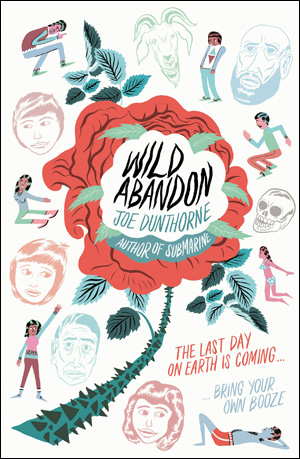You have no items in your cart. Want to get some nice things?
Go shopping
The follow up to 2008’s acclaimed Submarine, Joe Dunthorne’s second novel, Wild Abandon, takes as its focus a number of odd yet endearingly flawed characters practicing, in their words, “secular but authentic communal living” in South Wales.
Almost twenty years into its tenure, Blaen-y-llyn is becoming increasingly dysfunctional – and so, too, are its inhabitants. In the hopes of attracting much needed new, young members, and a reconciliation with his wife and daughter, commune founder Don sees drastic measures and overblown gestures as the only line of action, deciding upon an A-Level results party with a 10k sound system.
Right at the heart of the chaos is Don and Freya’s son Albert, an eleven-year-old who feels that a wave of destruction is poised to sweep through his life. In addition to his parents’ separation, he feels abandoned by his sister Kate, who leaves the community each day to study her A-Levels, and looks set to attend Cambridge once the autumn arrives. Additionally, it seems his only home-schooled peer, Isaac, is also set to disappear from his life. The ominous, astrological yarns detailing the end of the world spun by Isaac’s mother seem to Albert to account for the doom he senses brewing. The precocious young man becomes convinced of an impending apocalypse, and in the novel’s hilariously sordid climax, sees the rave his father has organised as the perfect time to distribute his words of warning.
Dunthorne’s talent lies in constructing characters from very minute observations. His portrayal of the complex idiosyncrasies of relationships often ring true. The author brings us vivid descriptions of the sights and smells of communal life – smell, especially; scent lies at the centre of the characterisation of each Blaen-y-llyn inhabitant. In many ways, Albert is desperate to become a teenager and expand his horizons, longing to “summon a bodily stench”, his own obscure marker of adolescence. Geodesic dome-dweller Patrick’s success in staving off the weed which racks him with paranoia can be gauged by the smell of bong water on his customary green fleece. Scent is used powerfully in the recounting of Don and Freya’s initial courting. In a reworking of one of the author’s earlier poems, the two meet as young students in a university swimming pool. As the author tells us, “the smell of chlorine would always remind them of their first kiss”, which takes place in the pool’s “intermediary foot-washing room”.
While the charm of Submarine was largely due to Oliver Tate’s skewed first-person narration, and his struggle to comprehend the complexities of his parents’ wavering relationship, Wild Abandon’s third-person perspective allows an objective account of the central couple’s history. The tale of three graduates (Freya, Don and jewellery artist/eventual Blaen-y-llyn resident Janet) and their naïve ideals dreamt up in university halls, which eventually lead to their foundation of a commune in rural Wales, is brilliantly funny, and perhaps warrants a novel by itself.
The idealistic threesome soon add their former landlord Patrick to their number, and after swiftly purchasing land, set about dreaming up policies to implement in their idyll. Don’s assertion that their children shouldn’t be passively subjected to advertising leads to Patrick’s invention of the “Ad-Guard”, a piece of shower-curtain which can be drawn over the television to obscure adverts from impressionable minds, an example of the clumsily whimsical innovations that abound the commune.
Dunthorne’s prose is fluid and elliptical, whilst also accommodating striking, figurative language, and achieving humour through incongruent images. When Patrick’s weed-induced paranoia reaches its apex, he manically flees from the commune, convinced his fellow dwellers are conspiring against him. He climbs a tree on the outskirts of the grounds and falls, and the search party finds him lying in the turning circle of a nearby housing development: “his thin boxer shorts were torn and stained, a purple testicle like a limpet against his thigh… his broken ankle, a half-deflated football, a geodesic dome, the skin dying, turning grey and dusty at the edges, and the impossible angle of his foot”.
It should be noted that Wild Abandon is not an attack on communal living or “alternative” lifestyles. Suburban life is portrayed with the same shades of disappointment and suppressed hope: when Kate leaves the commune to live with her boyfriend, she is struck by his family’s tedious, suppressed middle-class life. The novel speaks about idealism: how the constant struggles of life and rigours of relationships cannot be avoided through a lifestyle change, and how people inevitably grow apart from the beliefs they once held, as well as apart from one another.

There is a sense Dunthorne that has to juggle somewhat to accommodate the large number of characters central to the novel’s plot. While the humour found in Submarine had a certain immediacy and shock factor, Wild Abandon’s subtly crafted and slow building study of a community in slow demise delivers a memorable, implosive climax. Caveats aside, this is a wildly imaginative novel, its ambitious narrative a considerable departure from Dunthorne’s debut. The melancholic tone, dryly humorous dialogue and singular voice evident throughout make this an engrossing and affecting read. An excellent short story read on BBC Radio 3’s The Verb last month further suggests Dunthorne is an exciting author, with a lot still to say.
First published 4 August 2011. Available in paperback and ebook from Hamish Hamilton/Penguin.




